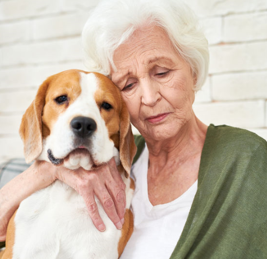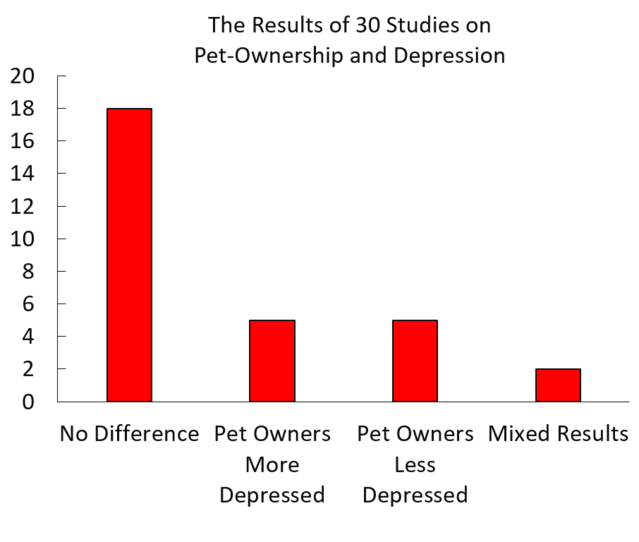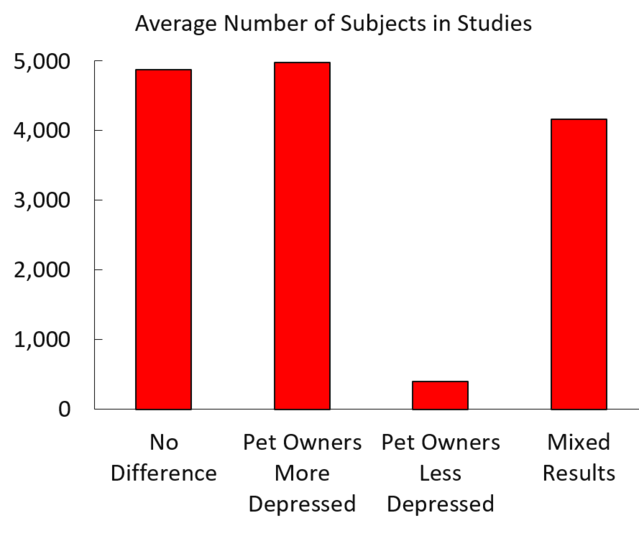Depression
The Sad Truth About Pet Ownership and Depression
What a review of 30 studies reveals about the impact of pets on depression.
Posted December 3, 2019 Reviewed by Gary Drevitch

**Note - see the end of this post for updated updated information on studies on pet ownership and depression).
According to The Independent, a British newspaper, “a growing raft of studies” shows that pets can alleviate a host of mental health issues, including depression.
The Independent is far from alone in proclaiming that getting a pet will chase your blues away. But media reports extolling the effectiveness of pets as a treatment for depression are typically based on just a few studies. So to get a broader picture of research findings on pet ownership and depression, I took a deep dive into the research literature on the topic. I expected that most studies would find that owning a pet was associated with lower rates of depression. After all, in response to a recent post on pets and suicide, several readers wrote to me, saying their relationship with their dogs had even kept them from killing themselves.
But that's not how the results turned out.
There Is a Lot of Research on Pets and Depression
Using Google Scholar, I located 30 articles in peer-reviewed journals that assessed depression rates in pet owners and non-owners. Fifteen of the studies were conducted in the United States, and most of the others were from Europe. Much of the research on pets and depression has focused on older people. Half of the studies involved elderly pet owners and non-owners, 12 involved adults of a wide range of ages, and 3 focused on youth.
What I found was surprising.
Most Research Shows That Pet Owners Are Not Less Depressed

- Eighteen of the 30 studies found that, as a group, there were no differences in rates of depression between pet owners and non-owners.
- Five studies reported that pet owners were more likely to be depressed than non-owners.
- A couple of studies obtained mixed results. One reported that unmarried women with pets were less depressed than no-pet counterparts, but the reverse was true of unmarried men. And a 1999 study found no general differences in depression rates of gay and bisexual men, but that HIV-positive men with pets who had few, if any, friends were less depressed.
- Only 5 of the 30 studies found that, as a group, pet owners suffered less from depression than people who did not live with a companion animal.
The Sample Size Issue
All other things being equal, researchers tend to have more confidence in studies with more subjects than studies with fewer subjects. In all, 117,233 participants were included in the 30 studies I reviewed, with the number of participants ranging from 88 to 53,418. The five studies which found that pet owners were less depressed had, on average, many fewer participants (Mean = 401 subjects ) than the studies that found no difference in depression rates (Mean = 4,683 subjects) or that found pet owners to be more depressed (Mean = 4,975 subjects). Eleven studies had more than 1,000 subjects, but none of those large studies reported that pet owners as a group were less likely to suffer from depression.

What About Older Pet Owners?
Fifteen of the studies focused on older adults, yet only one reported that seniors with pets were better off in terms of depression. Nine of the studies found no differences in depression levels of pet and non-pet owners. And four of them found that pet owners were more likely to be depressed.
Can Pet Owning Reduce Depression In Some People?
There may be exceptions for some groups. Here are a couple of areas that may be worth pursuing.
- Depression in Youth. Two studies reported that homeless kids with pets had substantially lower rates of depression (here and here). In another study, kids with positive attitudes towards pets had lower depression scores and delinquency rates.
- Social Loss. A 2019 study reported that older pet owners who had suffered a loss through the death of a spouse or divorce were less depressed than non-pet owners who had suffered a loss.
- Gender Differences. It is possible that the impact of pets on depression can vary by sex of the owner. A 2006 study, for example, found that unmarried women with pets were less depressed than non-owners, but unmarried male pet-owners had more depressive symptoms.
- Pet Attachment. You would think that people who are more attached to their pets would be less likely to suffer from depression. The results, however, are mixed. A 1989 study did find that owners who were more attached tended to be depressed, but the relationship was weak. But this study reported that among people living alone, more pet attachment was linked to more depression.
- Types of Pet Owners. It is quite possible, indeed probable, that some types of pet owners are more (or less) likely to suffer from depression than other types of pet owners. For example, researchers from Florida State University recently reported that women over 85 years old and living with only a cat were more likely to be depressed than other categories of older adult pet owners.
Why Would Pet Owners Be More Depressed?
For reasons that are unclear, in five studies, pet owners were more depressed than non-owners. One possibility, of course, is random chance. However, I think this is unlikely; three of these studies had more than 1,000 subjects. As is often the case with claims about the “pet effect” on human well-being, we don’t know the direction of the causal arrow. It is certainly possible that depressed people acquire a pet in hopes that their animal companion will alleviate their loneliness and depression. Researchers have also found that many pet owners become depressed because of the death or illness of a beloved pet.
The Bottom Line
After spending maybe 20 hours tracking down articles in obscure journals, poring over tables of depression scale scores, and emailing researchers for copies of their manuscripts, I have come to several conclusions.
- First, most research does not support the claim that pet ownership is related to lower rates of depression.
- Second, there are some exceptions. These include studies of homeless children and street kids, women and people with AIDS who live alone, and people who have lost a partner. More research is needed in these areas.
- Finally, according to a pet industry publicity campaign, “pets are increasing included in depression treatment programs.” The reality is, however, that most scientific studies have found that a puppy, no matter how cute, is usually not an effective replacement for Zoloft or Prozac.
There are lots of reasons to get a pet, but a treatment for depression is not one of them.
--------------
****Update - In November 2019 when I originally wrote this post, I had located 30 studies comparing depression in pet owners and non-owners. By December 2022, 51 studies had been published on the the topic in peer reviewed journals. By my count, 35 of these found no differences in the depression scores of pet owners and non-owners, 7 reported that pet owners were more depressed, 6 reported pets were less depressed, and 3 found mixed results.
If you are a researcher and would like a list of the 51 papers I found, send me an email.
Facebook image: Soloviova Liudmyla/Shutterstock
References
Carr, D. C., Taylor, M. G., Gee, N. R., & Sachs-Ericsson, N. J. (2019). Typologies of older adult companion animal owners and non-owners: moving beyond the dichotomy. Aging & mental health, 23(11), 1452-1466.




